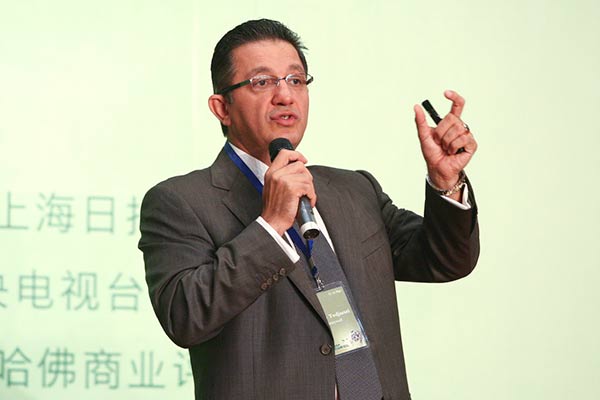Honeywell goes big on digital


Rapid digitalization adopted by various industries as well as at the ordinary citizen level in China is not just a challenge but a big opportunity for companies such as Honeywell International Inc, according to Shane Tedjarati, its president for "Global High Growth Regions", which includes China.
The US-based manufacturing and technology conglomerate's local head makes this point by recalling his personal experience of living and working in China. When he steps out of home, his pocket is always empty, he said.
"Everything is paid for electronically, even buying an egg from a lady in the street and tipping a doorman is conducted through a cell phone."
This kind of ubiquitous adoption of technology calls for a myriad related products and services, particularly those involving integration of multiple areas, or connectedness, he said.
"All of our businesses are going to be digital, like the connected aircraft. It's not just having Wi-Fi on the aircraft, but also the pilot being connected to the flight department, the APU (auxiliary power unit) connected to the maintenance department, those aspects are what we are going to do."
According to Tedjarati, China is currently the single largest contributor to Honeywell's global growth. The US firm's over $2.4 billion business in China saw double-digit growth last year, accounting for over 20 percent of its global growth.
Honeywell's high-growth regions consistently drive more than 80 percent of its growth and China has the biggest chunk of that, he said, adding that the country has been the company's second-largest market since 2013. It has also been its focus area for more than a decade, much of it under Tedjarati's watchful eye.
He has been working in China for 25 years and speaks six languages. The China market is unique in several ways, he said.
For example, Chinese consumers really care about air quality, water quality and food safety, and this provides Honeywell an opportunity to come up with an integrated technology that can address all such issues, Tedjarati said.
"So when we launch our air purifying product, it will be social media-connected, mobile-based, with payments and customer feedback in the loop and all that, so that parents can check if the school has been regularly changing the air purifier filters or your taxi is pollution-free inside.
"Fusing that through our IoT (internet of things) platform Honeywell Sentience means giving more power to the Chinese consumer, as you cannot force restaurants to clean their air by regulation, but real data does not lie."
In response to China's new smart city solutions that aim to tackle climate change challenges, including identification of pollution sources or inefficiency in cities, multinationals such as Schneider, Honeywell and Johnson Controls are bringing their technological solutions to the country.
Honeywell is working on a number of smart city projects across the country. This includes partnership with the Tianjin Economic-Technological Development Area. There, it will design and implement the country's first smart grid demand response pilot project.
It also provided intelligent, integrated building solutions and air purifying solutions to Wangjing Soho, a real estate project in Beijing housing commercial establishments.
Honeywell is also working with Chinese companies from various sectors, including power distributors, property developers and retailers, to boost the development of smart cities.
The company is one of the foreign suppliers working with Comac on the C919, China's first home-built wide-bodied passenger aircraft.
Honeywell currently employs about 13,000 employees in China, including more than 2,600 researchers.
"I want my researchers to think about the next three to five years and come up with things that Chinese need today, at the right price and with the right features," he said.
"We put the marketing, sales, designers, engineers and supply chain all together, to make sure we design a product that the Chinese like, the cheapest product combining the best quality and making sure it's going to be successful when it enters the market."
Honeywell signed two agreements with Chinese companies Oriental Energy and Spring Airlines in Beijing during US President Donald Trump's state visit to China late last year.
"The two agreements mark another significant milestone in the relationship that Honeywell has had with China since first establishing itself here in 1935," he said.
"Honeywell has made a longstanding commitment to China, and we greatly value our presence here."
He started his Honeywell career in China and India, and expanded globally to the high-growth regions of the world, where the company records much of its growth, including Southeast Asia, Africa, Latin America, the Middle East and Eastern Europe.




































